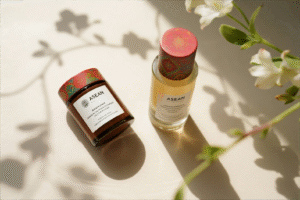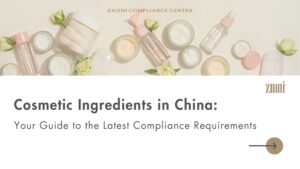+86 571 8659 2517
+86 180 5841 8258
info@zmuni.com

ASEAN's cosmetics market is rapidly growing, making it an increasingly important region for global brands. Regulatory frameworks are evolving alongside market demands, with ingredient restrictions being a critical compliance focus for regulators across member countries. This article provides a clear overview of the ASEAN Prohibited Cosmetic Ingredients List (Annex II Part 1), outlines key categories of prohibited substances, and highlights important considerations for companies referencing the list. 1. What is the ASEAN Prohibited Cosmetic Ingredients List? The ASEAN Prohibited Cosmetic Ingredients List corresponds to Annex II Part 1: List of Substances Which Must Not Form Part of the Composition of Cosmetic

01 Heightened Scrutiny on Popular Functional Ingredients Recent industry reports in China suggest that China Customs is increasing regulatory checks on 12 commonly used ingredients in health and wellness products: Artemisia argyi, Ergothioneine, Polypodium leucotomos extract, NMN, Quercetin, Saw Palmetto, Ashwagandha, Epilobium parviflorum, Erythrina mulungu, Damiana, Berberis aristata, and NAD+. Importers are now required to demonstrate that these ingredients comply with regulations in their country of origin and to provide supporting documentation to Chinese authorities. This isn't entirely new. In 2024, similar compliance requirements were applied to ingredients such as Coenzyme Q10, Chamomile, N-Acetylcysteine (NAC), Glutathione, Resveratrol, and others.

On July 24, 2025, China's National Medical Products Administration (NMPA) issued an official notice announcing that the children's cosmetics sector in China has entered a rapid development phase. According to the notice, as of the end of June 2025, China has recorded 28,168 notifications for children's general cosmetics (27,219 domestic and 949 imported products), alongside 427 registrations for children's special cosmetics (406 domestic and 21 imported products). This significant growth highlights not only increasing market demand but also the maturation of China's regulatory framework specifically tailored for children's cosmetic products. Why Overseas Brands Should

The global food industry is increasingly driven by innovation in new food ingredients, which offer novel nutritional, functional, or sensory benefits. However, bringing such substances to market requires rigorous approval processes in major markets like China, the European Union, and the United States—each with distinct regulatory frameworks. A critical question could arise amid this landscape: Do these regions grant protection periods to applicants after their novel food secure approval? This inquiry touches on the core dynamics of innovation incentives, market competition, and the balance between recouping R&D investments and fostering industry progress. 01 China: No Explicit

Last month, ZMUni Compliance Centre hosted a webinar focused on compliance requirements for special cosmetics in China. During the session, we introduced the basic definitions, regulatory pathways including registration and timelines for different product types, and shared typical enforcement cases involving non-compliant formulations. One major concern was the potential criminal liability linked to the use of prohibited or unapproved cosmetic ingredients — a growing issue in recent years. These cases highlight the need for full compliance, not just in formulation, but also in labeling and documentation. To manage these risks, companies must understand China's regulatory ingredient references. The Safety and

China is a global pioneer in the industrialization of recombinant collagen, leading in large-scale production and commercial application. With advantages in safety, functionality, and sustainability, recombinant collagen is gaining wider adoption across medical aesthetics, cosmetics, and functional nutrition. This article provides an overview of the regulatory requirements for recombinant collagen in China, focusing on its use in both the cosmetic and food sectors. 1. Definition of Recombinant Collagen in China In China, Recombinant collagen's applications are primarily focused in the medical aesthetics industry. The National Medical Products Administration (NMPA) of China has issued guidelines including the Naming Guidelines

As cosmetic brands expand internationally to strengthen their global presence, they must navigate a patchwork of regulations that vary widely by country—from safety standards to labeling and registration requirements. Understanding these differences is critical to ensuring compliance and avoiding costly setbacks. To help cosmetic enterprises better understand the regulatory landscape of key markets and mitigate potential compliance risks, ZMUni Compliance Centre has compiled an overview of major cosmetic regulatory authorities and relevant laws and regulations worldwide. Country/Region Competent Authority Key Regulation China National Medical Products Administration (NMPA) Cosmetic Supervision and Administration Regulation (CSAR) National Institute of Food and Drug

When querying overseas ingredient manufacturers and distributors about the requirements for exporting ingredients for cosmetic use in China, the most common response is "Yes, we've completed NMPA registration." However, what does NMPA registration truly entail, and what are the specific obligations for exporting cosmetic ingredients to China? This article offers a practical and up-to-date overview of cosmetic ingredients regulatory requirements in China to help relevant stakeholders navigate regulatory challenges with confidence. Regulatory Landscape: CSAR and Key Authorities China's cosmetics market is regulated by the National Medical Products Administration (NMPA). On January 1, 2021, the Cosmetic Supervision and Administration Regulation (CSAR)
+86 571 8659 2517
+86 180 5841 8258
info@zmuni.com